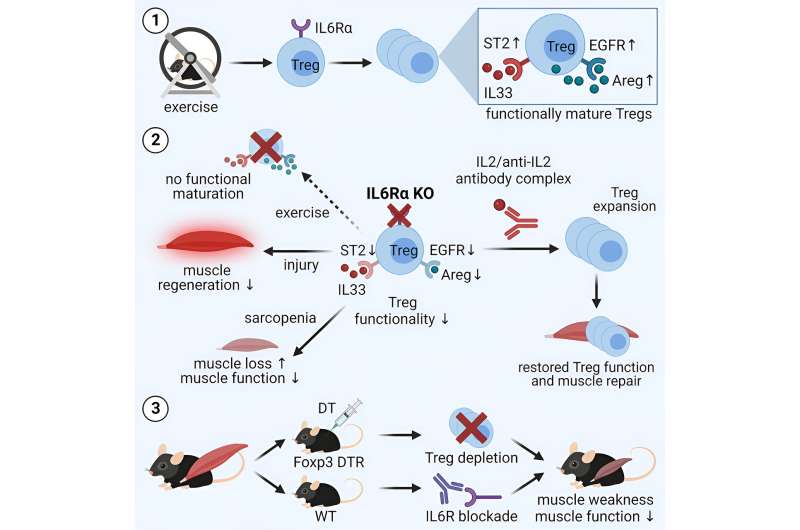This article has been reviewed according to Science X's editorial process and policies. Editors have highlighted the following attributes while ensuring the content's credibility:
fact-checked
peer-reviewed publication
trusted source
proofread
Exercise and muscle regulation: Implications for diabetes and obesity

How do our muscles respond at the molecular level to exercise? Researchers at Helmholtz Munich and the German Institute of Human Nutrition Potsdam-Rehbrücke (DIfE) have unraveled the cellular basis and signaling pathways responsible for the positive impact of physical activity on our overall health. Regulatory T cells, a type of immune cell, play a critical role in ensuring proper muscle function.
These novel insights are paving the path towards precision medicines targeting metabolic disorders like obesity and diabetes, as well as muscle-related illnesses. Their discoveries are published in Cell Metabolism.
Obesity and type 2 diabetes pose an increasing threat to our global health. Overnutrition and physical inactivity contribute to the development of these conditions. Exercise is not only effective for preventing diseases but also offers numerous health benefits including improving the immune system.
Researchers from the German Center for Diabetes (DZD) at Helmholtz Munich and the German Institute of Human Nutrition Potsdam-Rehbrücke (DIfE) revealed new insights on the interconnections between exercise, muscle function, and the immune system.
These new findings can not only benefit people living with obesity or type 2 diabetes seeking to improve their health through exercise or patients of muscle-related diseases, but also benefit professional athletes. Importantly, a better understanding of the immune-muscle crosstalk can contribute to the future development of precision immune therapies for diabetes and other complications.
Regulatory T cells ensure proper muscle function
Although the beneficial effects of exercise training on metabolic health and the immune system are commonly known, the exact mechanisms of how physical activity affects muscle immune cells remained unknown until now.
The team of researchers unraveled the molecular mechanisms by which a specialized subset of immune cells in the human body, the regulatory T cells (Tregs), control muscle crosstalk in a steady state, in response to exercise, as well as upon muscle injury. During exercise highly functional Tregs can be found in the muscles, which are important for proper muscle function, regeneration, and repair.
By manipulating the Tregs in multiple ways, the authors uncover their pivotal role in regulating muscle function, strength, and repair after injury. The research team identifies a critical mediator of these effects. A signaling pathway involved in the immune response and various other physiological processes, the interleukin-6 (IL6) receptor (IL6R) signaling on T cells, is critical for Treg functionality. The IL6R has to be present on the surface of T cells for the Treg-mediated control of muscle function.
These new findings can additionally offer a possible mechanistic explanation as to why anti-inflammatory treatment targeting IL6R has been associated with the development of muscle weakness as a side effect in the clinic. In conclusion, the new discoveries highlight the importance of dissecting the crosstalk between the immune system and the metabolism in conditions such as diabetes and obesity. These insights will be crucial for developing precision medicines targeting Tregs within distinct niches and contexts in the future.
More information: Maike Becker et al, Regulatory T cells require IL6 receptor alpha signaling to control skeletal muscle function and regeneration, Cell Metabolism (2023). DOI: 10.1016/j.cmet.2023.08.010





















